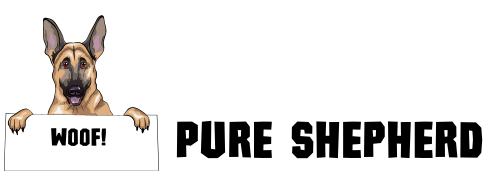Natural dog food and organic dog food are all terms you’ve probably encountered when shopping for something for your dog to munch on. But what exactly do they mean? Or – most importantly – why should you care about them?
The truth is, we all want the best for our GSDs – feeding and watering them is the bare minimum we can do. But throwing just about anything into the bowl is probably not the best of ideas.
You can avoid this by at least knowing what the different terms used on dog food labels mean. And that’s exactly what you’ll learn from this post so that by the end of it, you have a rough idea about what’s best for your German Shepherd.
The Difference in regulation between Human and Dog Food
You’ve heard of the FDA and its role in ensuring the utmost standards are adhered to in food and medicine, this mandate extends human products.
But did you know that the FDA also looks into animal feeds and veterinary products. However that doesn’t mean human and animal products are held to the same standards.
Unlike human food, pet food ingredients do not undergo such rigorous evaluation before hitting the market as being considered to be safe in the eyes of the FDA.
So what role does the FDA play in the pet food industry? Here are a few of the roles:
- Look into complaints raised by either consumers or vets
- Once-a-while inspection of manufacturing facilities
- Supervise pet food additives
The FDA also works closely with the Association of American Feed Control Officials (AAFCO) whose focus is regulating not just animal feeds but also drugs.
It’s also the body that defined the two terms – natural and organic – with respect to dog food.
The AAFCO Definition of Natural and Organic Dog Food
According to AAFCO, natural food is defined as feeds or feed ingredients obtained from animal, plant, or mined sources not having been produced by or subject to a chemically synthetic process and not containing any additives or processing aids that are chemically synthetic.
That’s quite a mouthful but what that basically means is natural dog food mustn’t contain stuff such as preservatives, artificial colors, and flavors.
For organic dog food, AAFCO relies on USDA’s standards to better define the term. So for dog food to qualify being called organic, it should be in line with the standards for organic human food.
And talking about standards, it’s the ingredients that matter.
For plant ingredients, the plants must be grown without additions like genetic modification, pesticides, sewage sludge, artificial fertilizers, and irradiation. For animal ingredients, on the other hand, the animals should be raised solely on organic feed, not be injected with antibiotics or hormones, and be allowed extensive time outdoors.
With that said USDA places organic food into four categories that you’ll find indicated on labels, namely 100 percent organic, organic, made with organic ingredients, and specific organic ingredients.
100 Percent Organic
Dog food in this category is made up of 100% certified organic ingredients.
Organic
The feed isn’t completely organic but most of the ingredients are. For the dog food to qualify to be in this category, up to 95% of all ingredients must be organic.
Made With Organic Ingredients
The “made with organic ingredients” label is used for dog food that has 70% of ingredients being organic. Unlike the other two categories, foods in this category do not bear the organic seal.
Specific Organic Ingredients
Foods in this last category have less than 70% organic ingredients. And as with the made with organic ingredients category, they don’t sport the USDA Organic Seal.

Choosing Organic and Natural Dog Food
Both organic and natural dog food can help your German shepherd be better health-wise, and you can go with either both or single options. But remember your focus should be more on your chosen food meeting your dog’s nutritional needs.
Beware of marketing gimmicks. Not every food labeled natural is necessarily that. The same applies to organic foods. The terms natural and organic are kind-of buzzwords now and manufacturers might include them to appeal to most people.
To avoid falling for this, be sure to check the ingredients. You’re more likely to then pick out the genuine ones from the rest. When making food choices, be sure you keep in mind things like your dog’s health, any allergies, and their age.
If you’re not so sure about what your four-legged friend should be eating, have a chat with a vet for expert advice. But for a general idea of quality dog food, looking out for animal protein, fruits, and veggies will do.
Here some natural and organic options to look into:
Our dogs love the Organix Chicken Dry Dog Food. USDA organic certified chicken dog food that contains no artificial preservatives, flavors or colors.
It’s nutrient packed with a blend of superfoods, including organic flaxseed, organic blueberries and organic sweet potatoes.
Blue Buffalo Life Protection Formula Natural Adult Dry Dog Food is a best seller!
We like it as a natural dog food which contains wholesome whole grains garden veggies and fruit, and those essential proteins and carbohydrates to help meet the energy needs of your adult dogs. Make sure they have a shiny coat and healthy skind with the omega 3 & 6 fatty acids, while the exclusive and precise blend of antioxidants, vitamins and minerals carefully selected by holistic veterinarians and animal nutritionists, support immune system health, life stage requirements, and provide a healthy oxidative balance.
Made from only the finest natural ingredients enhanced with vitamins and minerals. BLUE contains NO chicken (or poultry) by-product meals corn, wheat, soy, artificial flavors or preservatives.
Other Dog Food Options for Your German Shepherd
Aside from natural and organic dog food, here are a few other common terms you’re likely to run into in the dog food world.
Holistic Dog Food
The term “holistic dog food” is a bit ambiguous and might not mean much as far as food choices for your pet are concerned. Unlike organic and natural, holistic doesn’t have a generally accepted definition as far as dog food is concerned.
But generally, holistic dog food is considered to be about a less-processed diet and high-quality ingredients.
Hypoallergenic Dog Food
Hypoallergenic dog food is specially formulated for those German Shepherds, and canines in general, with food allergies. According to the Pet Food Institute between 10 to 15% of all allergies in dogs are food based.
Not so common but still, it can happen to your pooch. Typically, most dogs can have allergic reactions to ingredients such as beef, eggs, chicken, wheat, and corn.
Hypoallergenic diets contain hydrolyzed proteins so your dog wouldn’t react to them. But they’re not usually for the long term. You’ll have to use just feed them to your dog for long enough for the symptoms to disappear.
After that, you’ll have to introduce new foods without a selected ingredient until you figure out the one that your dog reacts to.
On the other hand, hypoallergenic dog food can also contain a novel protein, that is a protein type that your German Shepherd has never eaten before. This reduces the likelihood of an allergic reaction.
Homemade Dog Food
This exactly what it sounds like – instead of buying already made commercial food, you prepare a nice meal at home. That means buying the individual ingredients and combining them later on in measured quantities.
Since each dog is different from the next one right next to it, homemade dog food recipes are going to vary a great deal. Preparing a meal for your dog will require that you consider:
- Essential nutrients
- Your German Shepherd’s life stage (more on this later)
- Allergies
- Health status
You have to be really careful about this as you might expose your hound to health problems if your homemade food is short on nutrients. To be sure of what you’re doing, it’s always great to seek expert input from a vet.
Raw Dog Food
Feeding raw isn’t so different from homemade food. In this case, you’re trying to make a diet for your dog that is as close enough to what your dog would eat if it were out there in the wild. So you’ll have the likes of raw meat, fruits, veggies, and bones as part of your feeding regime.
This has the benefit of maintaining your dog’s health just like natural or organic options.
However be careful as it could also lead to health issues if not done correctly; a raw diet deficient in nutrients is sure to be detrimental to your German Shepherd. Aside from that, you and your dog run the risk of bacterial infection from handling raw meat.
As with homemade food, it’s always a good idea to contact a vet to be on the safe side.
Fresh Dog Food
A distinguishing factor about fresh food is that it lacks preservatives common with commercial dog food options. So your homemade and raw foods can also be referred to as fresh.
In the case where they’re produced commercially, the meals are frozen and must be kept in the freezer and thawed in the fridge when it’s feeding time.
If you are making the food yourself remember these food storage/timing requirements for best health practices.
Ethical Dog Food
Animal protein is a big part of many dog foods. Ethical dog food focuses on a means of feed production that protects the welfare of these animals. Ethical dog food brands get their products from animals brought up in the best of conditions – or so they claim. You may wish to do your own research if this is an important consideration for you.
Sustainable Dog Food
Sustainable dog food is all about reducing the environmental impact of the pet food industry. So instead of buying from any other company, you focus solely on those that have a proven record of environment-friendly production practices and sustainability.
Grain-free/Gluten-free
A gluten/grain-free diet is also a common option you’ll see when shopping for food for your German Shepherd. Is it worth the hype?
As per the name, the food here is devoid of grains wheat, barley, oats, and rye among others. The food is specially formulated for dogs allergic to gluten. But you can be sure, such pooches are quite rare so most probably you won’t really need to go for this option. So this is something that you should think really hard about before, and again following your vet’s advice cannot be overstated.
Puppy vs Adult Dog Food
Naturally, a pup is going to have different nutritional needs from an adult dog. For instance, a puppy will need more fats, protein, and select minerals as it has high growth spurts.
Despite this, you’ll have to be careful not to set your German Shepherd pup on a rapid growth rate. According to studies, large dog breeds that grow too fast are prone to hip and elbow dysplasia.
So you have to be on the lookout to grab the food that’s specially formulated for the big boys.

In Summary – Which Dog Food Option to Go For?
Natural and organic options do get a lot of attention and they can be a great if you’re prepared to do you research. Remember – the devil is in the detail – which in this case is the ingredients. Be sure to check what’s on the package to know what you’re feeding your precious dog.
Generally, the food will depend on your dog’s specific needs, and as long they’re are considered and taken into account on the whole you’ll be good to go. And finally if you’re looking for any help remember to check with your vet.
Now did someone mention lunch……






